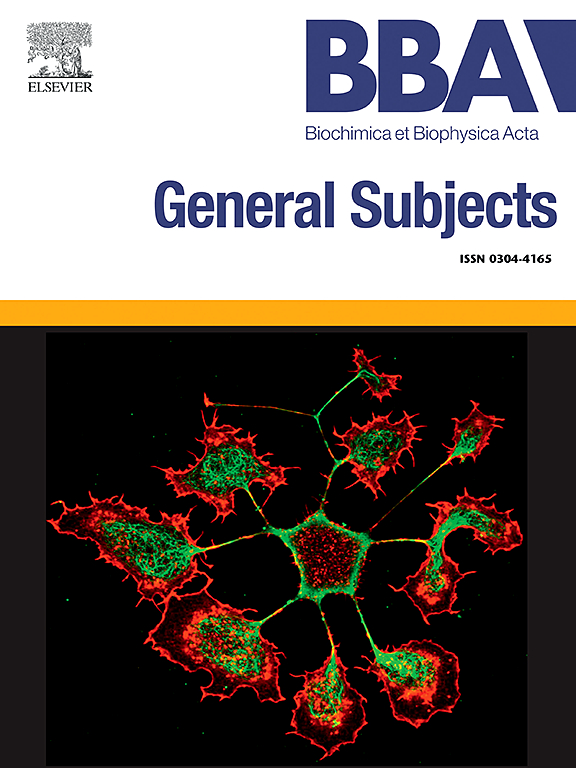顺式-3,4-二芳基-α-亚甲基-γ-丁内酰胺在培养的人肾癌细胞和斑马鱼胚胎中的生长抑制和毒性评价。
IF 2.8
3区 生物学
Q3 BIOCHEMISTRY & MOLECULAR BIOLOGY
Biochimica et biophysica acta. General subjects
Pub Date : 2025-01-07
DOI:10.1016/j.bbagen.2025.130761
引用次数: 0
摘要
本研究旨在比较和评价已合成的8种化合物顺式3,4-二芳基-α-亚甲基-γ-丁内酰胺(化合物1-8)对两种人肾癌细胞系CRL-1932(快速生长)和HTB-44(慢生长)的生长抑制作用。MTT实验和流式细胞术显示,化合物5和6在缓慢生长的RCC细胞(HTB-44)中具有诱导细胞死亡的潜力,而化合物8在两种RCC细胞系(HTB-44和CRL-1932)中均表现出有效性。此外,使用未转化的HEK293细胞系和具有绿色荧光肾Tg(w1b:egfp)的转基因斑马鱼来评估化合物5、6和8的毒性。研究结果表明,与其他化合物相比,化合物8相对无毒。Western blot分析表明,化合物5、6和8可能与P53/mTOR通路相互作用。基于这些结果,我们得出结论,化合物8具有抑制RCC生长的特性,并且具有较低的毒性,使其成为进一步研究哺乳动物模型的候选者。本文章由计算机程序翻译,如有差异,请以英文原文为准。
Growth inhibition and toxicity assessments of cis-3,4-diaryl-α-methylene-γ-butyrolactams in cultured human renal cancer cells and zebrafish embryos
This study aimed to compare and evaluate the growth inhibition effects of eight previously synthesized compounds, cis-3,4-diaryl-α-methylene-γ-butyrolactams (compounds 1–8), on two human renal carcinoma cell (RCC) lines: CRL-1932 (rapid growth) and HTB-44 (slow growth). MTT assays and flow cytometry were conducted, revealing that compounds 5 and 6 had the potential to induce cell death in the slow-growing RCC cells (HTB-44), while compound 8 demonstrated effectiveness in both RCC lines (HTB-44 and CRL-1932). Additionally, a non-transformed HEK293 cell line and a transgenic zebrafish with a green fluorescent kidney Tg(wt1b:egfp) were used to assess the toxicities of compounds 5, 6, and 8. The findings suggested that compound 8 was relatively non-toxic compared to the others. Western blot analysis indicated that compounds 5, 6, and 8 may interact with the P53/mTOR pathways. Based on these results, we concluded that compound 8 exhibits RCC growth inhibition properties and has lower toxicity, making it a candidate for further investigation in mammalian models.
求助全文
通过发布文献求助,成功后即可免费获取论文全文。
去求助
来源期刊

Biochimica et biophysica acta. General subjects
生物-生化与分子生物学
CiteScore
6.40
自引率
0.00%
发文量
139
审稿时长
30 days
期刊介绍:
BBA General Subjects accepts for submission either original, hypothesis-driven studies or reviews covering subjects in biochemistry and biophysics that are considered to have general interest for a wide audience. Manuscripts with interdisciplinary approaches are especially encouraged.
 求助内容:
求助内容: 应助结果提醒方式:
应助结果提醒方式:


